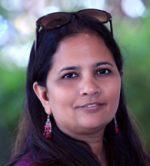I am struggling to write a note that encapsulates the general mood on campus. I am not sure it is even possible to do justice in a few words to almost a year of uncertainty, turmoil, and collective grief. Besides, how can I even begin to list the many challenges and questions we all have? Campus climate is a key indicator of inclusivity and equity, but without doing empirical research, I think we all know that we are not doing well.

The difficulty today, I think, for many of us is on how to balance what we feel about ourselves and our capabilities with how others (whether the “other” for us is the administration, or faculty, or staff, or students) see and evaluate us. As faculty and staff, we know who we are and what we do to keep this place running smoothly and add to our achievements, but are getting a very different sense of how the others view our contributions. We have no input in our own evaluation, and it leaves us feeling isolated and excluded.
Isolation and exclusion impact us psychologically. Disconnected from each other, we do not share a sense of belonging or ownership. Unconnected individuals are anything but kind or supportive of others. It is therefore not surprising that a high percentage of individuals reported through our last poll that bullying is a big issue on our campus. Bullying, of course, means that individuals get even more isolated and excluded.
Bullying means we are not an inclusive community. It also means we are discriminatory and that power amongst individuals and groups is imbalanced. In my role as CDO, I have tried my best to make the members of this community visible and accepted for their many identities, values, beliefs, and contributions. Whenever one identity group’s values and beliefs become central, equity and inclusion take a hit. An example of this is a recent decision by the administration to go for a 100% plant-based commencement reception. In the name of environmental sustainability goals, we did not engage in discussions to understand the political, economic, social, and cultural relationship that our “diverse” community has to food. How is that the values and beliefs of one group are prioritized over the beliefs and values of other groups with one particular goal in mind? Through the Allies at MIIS initiative, we wrote a letter to the administration questioning the decision from an inclusive framework.
We must strive to be more inclusive in our decision making, and we need more conversations about how to build an inclusive and equitable community. We need new tools. However, as Audre Lorde said, “The Master’s Tools will never dismantle the Master’s House.” We need new tools; we must think outside of the box in finding solutions. Moreover, as she says, we have to acknowledge the differences amongst us (our diversity) to find creativity because only then does the “necessity for interdependency becomes unthreatening.” We must not play ‘Oppression Olympics.’ We are more than the sum of our many identities, and as a campus community that prides itself on being diverse (without necessarily accepting diversity), it is time to acknowledge and celebrate those differences, embrace interdependence, become more inclusive, and build equity.
They say that when you hit rock bottom, there is always a silver lining. You begin to float back up and we will. How we float back will be a testament to who we are as a community and what we stand for as a collective. Can we rise to the challenge? I think, together we can!
Have a wonderful summer everyone and congratulations to our graduating class!
Best wishes,
Pushpa Iyer


